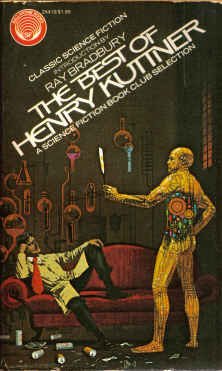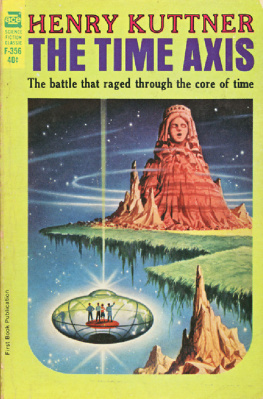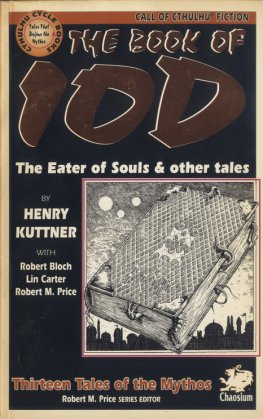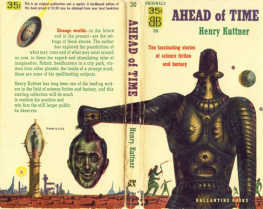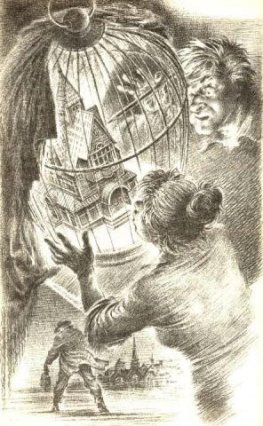THE BEST OF HENRY KUTTNER
Henry Kuttner: A NEGLECTED MASTER
Move around in high schools and colleges, in various semi-intellectual circles high and low, and listen to the names spoken there when books come into the conversation. A great deal of the time youll hear: Tolkien. Lovecraft. Heinlein. Sturgeon. Wells. Verne. Orwell. Vonnegut. And, you should excuse the expression, Bradbury.
But not often enough Kuttner.
Why is this so?
Why has Henry Kuttner been so unfairly neglected since his death back in the late fifties?
Was he as good a writer as the others?
Yes.
Did he write as much?
In some cases more.
Was he a pomegranate writer popping with seeds, full of ideas?
He was.
Was he as flamboyant as the others mentioned?
Perhaps not enough.
Did he sound his own horn?
Rarely.
Perhaps he was too diversified, working in too many sub-areas of the science-fiction and fantasy genres.
That may well be.
In any case, this book will remedy the need for a collection that can be handed around in and out of schools and will cause the name Kuttner to be spoken more frequently in the years ahead.
But before we consider all the reasons for Kuttners temporary obscurity, I must lapse into the personal and linger there awhile.
This introduction to Henry Kuttner must be very personal or it will be meaningless. I will not burden you with endless intellectual weighings and assayings of his stories. That is for you to do as you move along through this fascinating book, realizing that you have come upon the work of a man who helped shape science fiction and fantasy in its most important years years which included the decline of Weird Tales, the growth of Astounding Science Fiction, and the amazing birth of Unknown, and The Magazine of Fantasy and Science Fiction. I speak roughly of the time between 1938 and 1950, when most of the truly important writers in the field erupted on the scene, many of them encouraged by John W. Campbell, Astoundings editor.
Kuttner was one of those writers.
If you will allow the blasphemy, I will not soon forgive Cod for taking Kuttner out of this world in 1958. His death alone made that year a bad one for remembrance. It was especially bad because his talent was peculiar and special.
We would like to pretend that the populations of our world are full of undiscovered geniuses. From what I have seen, that simply is not true. The genetically intuitive talents are rare. Creative people are few and far between.
It is the rustiest of cliches to say, upon the death of most people, that they were irreplaceable. Save on a personal and loving level, this is just not so. Hundreds of writers, one not distinguishable from the next, might be replaced tomorrow without changing our universal culture in any way.
Because we are surrounded by oceans of the noncreative, and open fields of unprocreative mulch, I much admire the intuitive Henry Kuttner. He was indeed special, peculiar and, in his own mild way, manic-ally creative.
I would like to be able to recall all sorts of wondrous things about Henry Kuttner. The facts are otherwise, however. He was a shy man who gazed at you and thought his private thoughts.
I am sure that he found me ridiculous and amusing a good deal of the time. At our first meeting I was seventeen, which means in my case, anyway I was so unsure of myself that I did a lot of running around, shouting, and speechifying to hide my confusions and private despairs. Kuttner put up with this for an inordinate number of years and then gave me the best piece of creative advice I ever got.
Ray, he said one day, do me a favor?
What? I asked.
Shut up, he said.
I beg pardon?
Youre always running around, grabbing peoples elbows, pulling their lapels, shouting your ideas,
Kuttner replied. You give away all your steam. No wonder you never finish your stories. You talk them all out. Shut up.
And shut up I did.
Instead of giving my stories away free, by mouth, I began to write a story a week. Since that time I have never spoken about my ideas until, in their final form, they were on their way East via airmail.
If shut was Bradbury, then shut indeed was Kuttner.
Frank Lloyd Wright once described himself as an old man mad about architecture. Kuttner, in his twenties and thirties, was a young man mad about writing. Other peoples, first; his own, finally. His was not an ebullient and loud madness, as mine has been. Henry played a muffled drum to his own tune and marched quietly and steadily after his Muse.
Along the way, he helped edit, write, and publish his own fantasy fan magazine Sweetness and Light, about the same time that I was editing and publishing my own fairly dreadful mimeographed Futuria Fantasia, with occasional articles by Kuttner and Heinlein.
Along the way, he also sneaked me the names of people who might influence my life. Try Katherine Anne Porter, he said, shes great. Have you read Eudora Welty? he suggested, and if not, why not?
Have you re-read Thorne Smith? Get to it. How about the short stories of Faulkner, or heres one you never heard of John Collier.
He lent me copies of various mystery writers and advised me, as did Leigh Brackett, whom he was helping, too, to try James Cain, Dashiell Hammett, and Raymond Chandler. I obeyed.
It always seemed, to Brackett and me, that every time we looked up there was Kuttner half a block ahead on the road, going in or coming out of libraries. The last time I saw him was on a bus headed for UCLA and the vast library there, where he swam in the stacks with a beatific and quiet smile.
He wrote steadily, but I wish he had yelled on occasionas I have yelled to call attention to himself.
It is time now for us to pay attention, to draw near, to look at the quiet patterns in the wallpaper and End Kuttner out.
Leafing through the contents of this present volume, I find, to my dismay, that there are no convenient handles by which to pick Kuttner up. He wrote serious stories and light stories. He was not a science-fiction writer or a fantasist or a humorist, and yet he was all of these. If he had lived much longer he might have been troublesome to critics and librarians who like to slap precise labels on authors and file them neatly on shelves.
Kuttner was also troublesome to himself. His first published story, The Graveyard Rats, became an instant classic when it appeared in Weird Tales when he was still a teen-ager. This swift fame for what is in essence a grisly, but finally brilliant, story caused Henry to fail into uneasy silences in later years when the story was mentioned. He did not really want to become a minor-league Lovecraft.
He went through a long period of trying and testing himself. During this time he wrote dozens of undistinguished tales for the various science-fiction pulps, until Thome Smith out of John Collier out of Robert E. Howard became the at-last-remarkable Henry Kuttner.
Where was the turning point? When did the pulp writer become the writer of quality? I imagine we could point to a half dozen stories that appeared in Campbells incredible magazine Unknown. But I prefer to select two which popped our eyes and dropped our mouths agape in Astounding. I feel a deep personal response to them because, in the weeks during which he was finishing The Twonky and Mimsy Were the Borogoves, Kuttner gave me copies of the stories to take home, read, and study. I knew then what everyone else knows now; I was reading two stories that would become very special in their field.
It would be hard to guess the impact of these two stories on other writers in the genre. But in all probability hundreds of imitations were written by struggling as well as by published authors. I count myself among them. I very much doubt that my Zero Hour, or for that matter The Veldt, would ever have leaped out of my typewriter if Kuttners imagination had not led the way.

